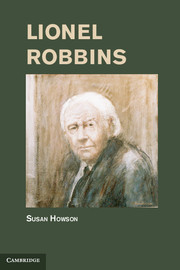Book contents
- Frontmatter
- Contents
- Illustrations
- Abbreviations
- Introduction
- One Father and Son
- Two The Great War
- Three Postwar
- Four The London School of Economics
- Five Iris Gardiner
- Six New College Oxford
- Seven The Young Professor
- Eight Fritz and Lionel
- Nine The School in the Mid-1930s
- Ten The Approach of War
- Eleven The Economics of War
- Twelve Director of the Economic Section
- Thirteen Anglo-American Conversations
- Fourteen The Law Mission and the Steering Committee
- Fifteen 1 9 4 4
- Sixteen The Last Months of the War
- Seventeen The Postwar Settlement
- Eighteen Return to the School
- Nineteen The End of the Transition
- Twenty LSE in the Early 1950s
- Twenty-One Chairman of the National Gallery
- Twenty-two Lord Robbins
- Twenty-three The Robbins Report
- Twenty-four The Sixties
- Twenty-five The Arts
- Twenty-six The Troubles at LSE
- Twenty-seven Retirement
- Conclusion
- Bibliography
- Index
One - Father and Son
Published online by Cambridge University Press: 07 October 2011
- Frontmatter
- Contents
- Illustrations
- Abbreviations
- Introduction
- One Father and Son
- Two The Great War
- Three Postwar
- Four The London School of Economics
- Five Iris Gardiner
- Six New College Oxford
- Seven The Young Professor
- Eight Fritz and Lionel
- Nine The School in the Mid-1930s
- Ten The Approach of War
- Eleven The Economics of War
- Twelve Director of the Economic Section
- Thirteen Anglo-American Conversations
- Fourteen The Law Mission and the Steering Committee
- Fifteen 1 9 4 4
- Sixteen The Last Months of the War
- Seventeen The Postwar Settlement
- Eighteen Return to the School
- Nineteen The End of the Transition
- Twenty LSE in the Early 1950s
- Twenty-One Chairman of the National Gallery
- Twenty-two Lord Robbins
- Twenty-three The Robbins Report
- Twenty-four The Sixties
- Twenty-five The Arts
- Twenty-six The Troubles at LSE
- Twenty-seven Retirement
- Conclusion
- Bibliography
- Index
Summary
Lionel Charles Robbins was born on 22 November 1898, the first child of Rowland Richard Robbins and Rosa Marion Robbins (née Harris), at Sipson Farm in the village of Sipson just west of London. He described his birthplace in his autobiography (1971a, 18): ‘Sipson itself was nothing memorable, little more than a conjunction of four roads lined with labourers’ cottages, three public houses and four farmsteads, of which that of Messrs Wild and Robbins, my father’s farm, was by the far the largest.’ It was one of four villages within the parish of Harmondsworth, the others being Harmondsworth, Longford and Heath Row. Longford was on the main road from London to Bath, Harmondsworth and Sipson to the north of it, Heath Row due south of Sipson on the opposite side of the Bath Road. North of Sipson lay the Grand Union Canal and West Drayton, with the nearest railway station. Today Sipson is bounded by the M4 motorway on the north and, immediately south of the Bath Road, London’s Heathrow Airport. The spur road between them runs across the land Lionel Robbins’s father used to farm.
Rowland Richard Robbins (1872–1960) was the eighth of nine children of Rowland Robbins and Caroline Robbins (née Ebbs), with two elder brothers Frank and Arthur. Their father was a prosperous London greengrocer, with two shops in Knightsbridge and Kensington, who was able to send his younger sons to public schools and to set Arthur up as a market gardener in Chiswick to provide fresh vegetables for the shops. After working with Arthur, Rowland, with no prospects in the family businesses, offered himself as a junior partner to Thomas Wild (1848–1932), whose family had lived and farmed in Sipson for several generations. Wild had been seriously ill and unable to run his farm, and his son, another Thomas, was too young to take over. Robbins was highly successful, becoming the senior partner of an enterprise which at its peak farmed more than 500 acres and employed 200 people. In the early 1930s, when agricultural prices were severely depressed, it was valued at nearly £45,000. The firm specialized in produce for the London market, sending fruit and vegetables up to Covent Garden every weekday evening. Robbins was, according to his eldest daughter, ‘an intellectual farmer [who] learnt farming out of books: he read up about everything he did.’ He served as president of the National Farmers’ Union in 1921 and 1925.
- Type
- Chapter
- Information
- Lionel Robbins , pp. 11 - 24Publisher: Cambridge University PressPrint publication year: 2011

